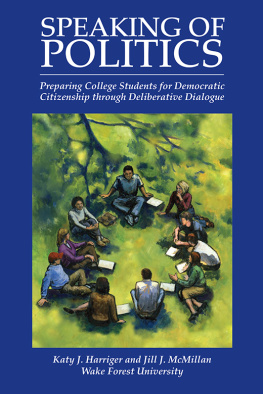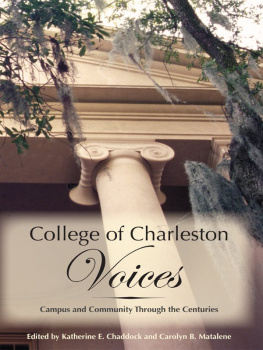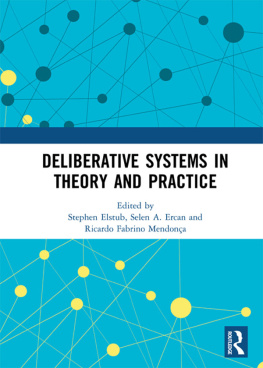2007 by the Kettering Foundation
ALL RIGHTS RESERVED
Speaking of Politics: Preparing College Students for Democratic Citizenship through Deliberative Dialogue is published by Kettering Foundation Press. The interpretations and conclusions contained in this book represent the views of the authors. They do not necessarily reflect the views of the Charles F. Kettering Foundation, its trustees, or its officers.
For information about permission to reproduce selections from this book, write to:
Permissions
Kettering Foundation Press
200 Commons Road
Dayton, Ohio 45459
This book is printed on acid-free paper.
First edition 2007
Manufactured in the United States of America
ISBN 978-0-923993-22-1
Library of Congress Control Number: 2007925891
SPEAKING OF
POLITICS
Preparing College Students for Democratic
Citizenship through Deliberative Dialogue
Dedicated to the memory of our mothers
Jean K. Harriger (1921-2005)
who liked to talk, but knew how to listen
and
Mary Elizabeth Hall Jordan (1914-1949)
whose example as a young teacher of
expression inspired me many
years later to take up her cause with
a new generation of young people
Acknowledgments
Without the 30 young people, the Democracy Fellows, who began this journey with usand especially the 26 who completed itthere would be no book, and more important, no long-term look at how extensive exposure to deliberative democracy can affect college students. Because these students were promised anonymity from the start, we cannot list their names here, but we express to them our profound gratitude and readily acknowledge that in the pages of this book, what the reader will hear is in large part their story, not ours. Likewise, we thank the members of the cohort group who offered their time each year and their voices to provide us a counterbalance to the experiences and expressions of the Democracy Fellows, and the deliberation participantsthose one-time deliberators from the fall of 2002who taught us one of this studys most profound lessons: that even a single experience with deliberation can indeed alter ones political outlook and optimism.
In every project of this magnitude and length, there are individuals who step up to help in invaluable ways, and that was our experience as well: from the Wake Forest administration, Ross Griffith of the Office of Institutional Records regularly provided us with timely statistical information and advice and assistance about how to use it, and Ken Zick and Mary Gerardy, from our Division of Student Life, also lent feedback and encouragement. Undergraduate and graduate student assistants performed vital tasks: Nicole Kazee and Allison Crawford did critical background research; Rebecca Jerome and Terry Dumansky scheduled and managed the paper work on interviews and focus groups; Elizabeth Lundeen did virtually everything mentioned here, but her most notable and unique contributions were her exemplary copyediting and footnote/citation management; Terry Dumansky and Colleen Colaner helped with thematic analyses of certain data sets; and Leanne Quatrucci, Allison Spangler, and Connie Chesner assisted in the assembling of annual reports. Joanne Vansice served this project with transcription par excellance. Her skill, professionalism, and abiding good humor through garbled tapes and all manner of other human and technologically induced errors was remarkable.
Underpinning all of the on-site help was the continual presence and support of John Dedrick of the Kettering Foundation. Though keeping us grounded and realistic from the start was not an easy task, John managed to do that in his own kind and inimitable way. We also are grateful for the gentle presence and support of Debi Witte and, later in the project, Laura Grattan. Ilse Tebbetts proved to be an effective and accommodating editor as she assisted us in our attempt to give this story its best hearing.
Finally, we thank Bob Griffiths and Toney McMillan, our husbands and partners, and our respective families for their patience and support during this lengthy project.
Contents
An Experiment of More
Than Ordinary Significance
S peaking of Politics is about a discovery and an inventiona breakthrough in combating the privatization that threatens to rob college students of their public lives. This is also a book about faculty members Katy Harriger and Jill McMillan, who went beyond charted waters to combat this threat. And it is a book that challenges colleges and universities to take more seriously their mission statements to prepare students to be citizens.
The argument that preparing students to be citizens requires the same self-conscious effort as preparing them to be historians, musicians, or accountants can be very unsettling. For instance, a faculty member at another institution reported that when he pressed for specifics on what his institution was doing to provide the civic education promised in the catalog, he was met with considerable resistance. The issue didnt resonate well with most of his colleagues, and they quickly tired of his persistence in raising it. They found a solution: they took the reference to citizenship out of the catalog.
This incident is relevant here because Wake Forest hasnt abandoned its responsibility for civic education. In fact, the two faculty members who wrote this book have given a new meaning to this type of education by giving a new meaning to democratic politics. That was the invention that led to a breakthrough. Students in the experiment discovered another dimension to democracy and a new role for themselves as citizens. The effect of what happened at Wake Forest was so profound that the Kettering Foundation has touted the Democracy Fellows project as one of the most significant innovations it has seen in 20 years. (Ketterings relation to the experiment, I should explain, has been that of a research institution, which doesnt make grants.) What happened at Wake Forest happened because two members of the faculty had compelling reasons to change how they went about their work as teachers and scholars.
The Wake Forest experiment is significant because it was informed by an acute sense of the troubles facing modern democracy. Professors Harriger and McMillan have been very aware of the contest now going on over the kind of democracy that will shape the twenty-first century and the role citizens will play in it. The democracy that characterized the second half of the twentieth century is in serious trouble. Look at the titles of several recent books: Demosclerosis, Democracys Discontent, Democracy at Risk, Downsizing Democracy.1 All of these studies report that democracy is facing fundamental problems, which I have called megachallenges. Determining where higher education stands in all this ferment seems inescapable to me. And the Wake Forest experiment addresses one of the most serious of these challengesthe relegation of the supposedly sovereign citizenry to the sidelines of politics.
Americans sense that they have been marginalized, and in one of the books just cited, Matthew Crenson and Benjamin Ginsberg show why. For more than two centuries, they write, ordinary citizens were important actors, but they argue that our political system has found ways to operate without a collective public.2 People sense their marginalization and see evidence of it in gerrymandered districts that discount the votes of all but the core of electors needed to return most incumbents to office. And while citizens like to hear the government promise to be more responsive to them as customers, they know that they should













